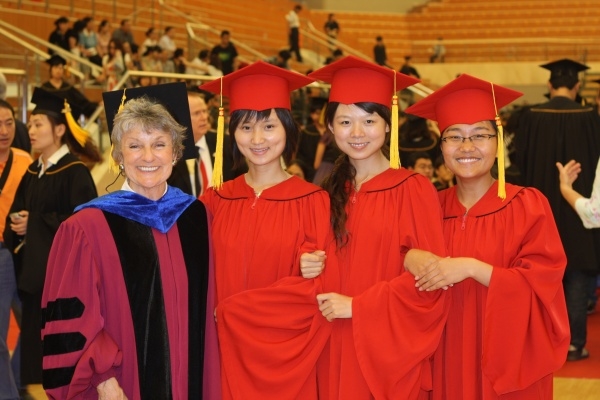
By Patricia Caso/November 18, 2013
Facebook: World Academy for the Future of Women
Jerrie Ueberle is a no-nonsense leader to be reckoned with. Leadership is the very quality she intends to instill in young women worldwide through her World Academy for the Future of Women. She wants them, globally, to share equally in advancing the planet and to lead fulfilling lives of their choosing.
“When we bring women into the Academy, they discover they have a voice, a choice, a path to discover their purpose and their passion and the path to success.” Jerrie Ueberle
I wanted to know more about the woman who has taken on such a monumental task. I caught up with this seven-day-a-week social entrepreneur by phone in Phoenix, Arizona and learned more about what makes this vision a necessity…
EYE: Why did you decide to initiate the World Academy for the Future of Women? That sounds like a huge goal.
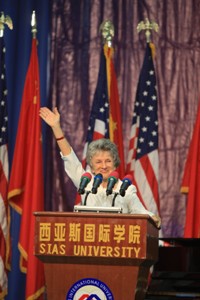
JERRIE: I had attended the United Nation’s Women’s Forum in 1995 in China and in 2000. Conversations from that forum developed the United Nations Millennium Development Goals. I was absolutely thrilled with the possibilities of addressing basic human issues like poverty, hunger and education.
Then when I revisited it many years later, I noticed that the 15-year plan had not been nearly achieved, and some of the issues were even greater than when they were announced as a Millennium goal in the year 2000. The only thing I could identify as missing in achieving the goals was leadership, specifically for women.
On May 3, 2009, in Henan Province, China at SIAS International University, I announced the World Academy for the Future of Women. The Academy opened for the academic year in September 2009.
EYE: Did your day job also tip you off that women needed attention?
JERRIE: Global Interactions, my non-profit, is my main job but World Academy takes up the majority of my time. Since 1984, we had connected teachers with teachers, doctors with doctors, surgeons with surgeons and people from emergency management, etc. Yet, out of those successful connections and notable progress, I wasn’t seeing a lot of women in these partnerships.
“This part of China seemed to be the perfect place to proactively teach leadership, making change a reality.”
EYE: What was it about China that made you want to start your Academy there?
JERRIE: I’d previously worked and given conferences in China with Global Interactions. I was very aware that 100 million people live in Henan province and most of them are agrarian. Many of them are certainly poverty level; people make less than a dollar a day.
The women and men at SIAS University in the Academy represent that population. So everything we do for them, they can do for their village. This part of China seemed to be the perfect place to proactively teach leadership, making change a reality.
EYE: What myths exist about young women in China?
JERRIE: Myths like village women are shy and probably not well educated, that they are not motivated and destined to repeat the cycle of poverty. When we bring women into the Academy, they discover they have a voice, a choice, a path to discover their purpose and their passion and the path to success.
As a result, we just need to get out of their way. They are inspired about what they can do for themselves and for others. I think the “and for others” service has been the most significant attribute of the Academy.
“There is so much to do on this planet that is totally fulfilling and is recognizable as the result of the effort you put into it.”
EYE: Would you say that leadership is not just about moving toward financial success?
JERRIE: We’re not about simply training leadership for corporate executives. We’re more interested in changing leadership to look at basic human values. One of my Board members said we should hire “bored” executives to get the job done! Those would be executives who are not fulfilled with the corporate leadership role and are much more passionate about having humanity succeed.
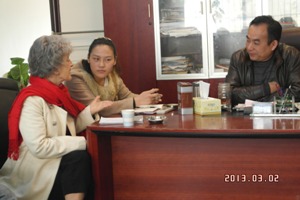 EYE: What is the potential for students involved in the Academy?
EYE: What is the potential for students involved in the Academy?
JERRIE: The potential for possibility. We are looking at what’s possible for women who saw no possibility for themselves and men who saw no possibility other than life repeating itself in jobs that are not personally fulfilling.
There is so much to do on this planet that is totally fulfilling and is recognizable as the result of the effort you put into it. It’s work, but it’s not monotony, and it’s not sacrificing your soul. It’s enriching. I want our students to understand that their capacity is productive.
EYE: How did you make WAFW a reality?
JERRIE: I came home from China after making my announcement and was struck with the fact that I had no idea what I was taking on or how I was going to do it. So, I just put it out on the internet and people started to respond.
Men and women leaders have taken the challenge to learn how to devise a leadership curriculum. They become facilitators. Many cannot afford the airfare to China and the five weeks that the program takes, but they’ve let this idea touch them. They’ve raised money; they’ve talked to their employer and said this is something I need to do with time off.
“Leadership is not about credit; leadership is about service. This is rigorous.”
EYE: What qualifies one to be a facilitator?
JERRIE: Facilitators must be flexible and must have had a broken heart and bruised knees. Wisdom and experience go a long way. Facilitators are skilled in leadership training, generous with their time and resources.
A successful applicant also has the sense that she/he could do more with those talents to be fulfilled. Facilitators are responsible for creating the environment for these students who don’t even know they can dream.
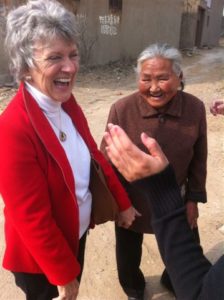
EYE: What can students participating in WAFW expect?
JERRIE: The students in the Academy do not get university credit, and they must spend 8-10 hours a week in the programs and activities in addition to their academic curriculum. Their academic curriculum is first and foremost. The Academy is extra and they cannot stay if they don’t give 8-10 hours a week.
Leadership is not about credit; leadership is about service. This is rigorous. So they really are there committed to providing a service, to develop.
EYE: I also understand each student must commit to one Millennium Goal for her/his tenure with you?
JERRIE: We produced a three-day event within the United Nations program to end poverty in September 2010. We’ve continued to ask the students to make noise, take action and stand up. On the first day each Academy student signs a commitment card selecting which millennium goal they will stand for.
“In whatever positions they hold, I want them to be sensitive to a much larger population than the population of their corporation or their customers or clients.”
EYE: Is going back to improve their villages a goal?
JERRIE: Going back to the village is not the goal. I care wherever they go that their village and that the issues related to the Millennium Goals are in their hearts and minds. So, if she is a ballerina, she dances because she knows women in the village have not had opportunities and have not had an education.
In whatever positions they hold, I want them to be sensitive to a much larger population than that of their corporation or their customers or clients. That sensitivity should make them responsive in social networking, social media, community campaigns for HIV Aids, alleviating poverty or giving students opportunities for education.
It is a part of their fiber as a woman or man that this awareness is ongoing. It is part of any leader’s spirit.
EYE: How does the idea of leadership differ with U.S. students and Chinese students?
JERRIE: Something American students have to get over is their sense of entitlement. They really have to know that to handle the problems of the planet, it really is going to require leaders to work, not just hold positions and to do it in collaboration. That is part of the mission and the oath of the World Academy.
American students can fail and fail and fail. Chinese kids can fail once; then they are out of the race. So they are very hesitant. Giving a wrong answer is really detrimental. In the U.S., giving a wrong answer is a way of finding the right answer. It’s part of the learning curve. In China it is not.
“They have to learn the courage to put themselves out there. One of the things the kids say at the end of a year is that they are braver and have more courage to take risks.”
EYE: In addition to risk taking, are there other barriers Chinese students from these rural areas face?
JERRIE: Yes. The ability to see what needs to be done. These students grew up in villages that look a certain way. The element of environmental insanity like debris, polluted water, and garbage all over the place is taken for granted.
And they’ve come to see that as their village, rather than it being offensive, it’s home. When I go to the villages we sleep three in a bed, no latrine; it’s a hole crawling with maggots, very sparse, no flowers, no grass…it’s not pretty. So they don’t see the possibility of being any different.
They don’t often see their family or friends being different. That’s just the way it is. So lacking vision, or being really able to say “I can do this!” is a huge area for us to address with them.
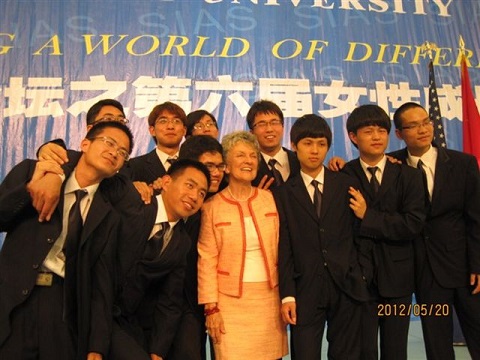
EYE: How did you know your vision for these students was working?
JERRIE: I knew it when a student stood up, talked about her dream to own a bakery, went home on holiday and asked a local baker if she could learn how to bake cakes. Another young woman, who participated in the Academy and barely spoke English, ended up being a translator for a glass factory in her village area, traveling to Finland, the Czech Republic, Germany and Poland as an interpreter.
In 2011, 20 male students signed up for a Men’s Academy for the Future of Women. Also, teachers tell me that they know an Academy member in class because they are quick to participate, using critical thinking. Self discovery, hope and possibility grow every day.
EYE: What kind of feedback are you getting?
JERRIE: One male student wrote to me, “When I came to Academy, I wanted to be a manager; now I want everyone to make everyone managers.” Every year we have a tea for the moms. Few attend because their moms are farmers, and cannot afford the trip or don’t want to embarrass them.
One mother who made the trip said, “My son came as a boy and now I see he is a man.” Another said, “My daughter is working on an environmental project. When I go home I am going to replicate that project in our village.”
“Yet, when all is said and done, I believe the Academy is unstoppable in weaving together hearts and minds.”
EYE: Has this journey with the Academy changed you?
JERRIE: I think I am not as serious as I used to be. I am a more joyful person.
EYE: What do you see for the Academies for the Future of Women and Men?
JERRIE: Certainly we have challenges to find funding for all the international requests to establish Academies in other countries and continue with training facilitators. Yet, when all is said and done, I believe the Academy is unstoppable in weaving together hearts and minds.
EYE: Thank you, Jerrie, for sharing your insights and details of your amazing work. Continued success to you and especially to your Academy students! For more information about this program, you can go to the Academy’s website.
Photos provided by Jerrie Ueberle
###
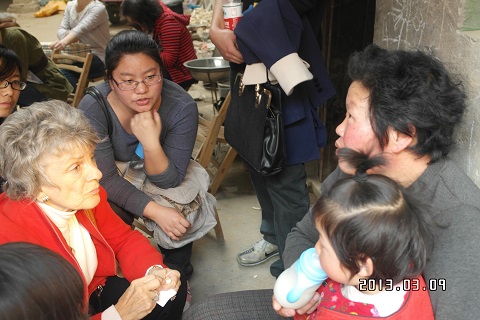
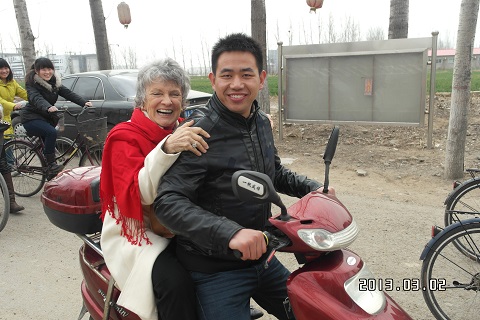


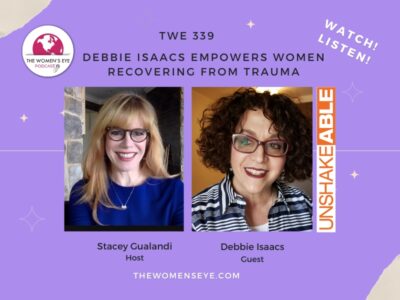
Women are making a world of difference!As a Chinese student ,I am so proud of being the member of World Academy for the Future of Women,Jerrie inspired me a lot and she changed my life,she changed Sias students’ life ,She is changing the World. We are courageous and will go beyond our personal and geographic boundaries,We will live a meaningful and fully expressed life !
Thank you so very much for your comment, Monday Tao! It is so great to hear from someone who has benefitted from Jerrie’s vision. You and your peers are the change makers and leaders that give her World Academy for the Future of Women life, meaning and success. Interviewing Jerrie was indeed a pleasure. May your own future endeavors continue to be fruitful!
Women are making the world difference!!! I am a students at SIAS University , I was a memeber of World Academy For The Future Of Women,2012~2013. During that year , I learned to be confident ,passion and practice. WAFW let me know : Leadership do not mean leading others but yourself . My mom attented the Symposium 2013 and the “Mother Tea”, She was deeply inspired by Jerrie and she was very happy that her daughter can join in World Academy For The Future Of Women. I hope WAFW can inspire more people. Best wishes to World Academy For The Future Of Women, Best wishes to Jerrie.